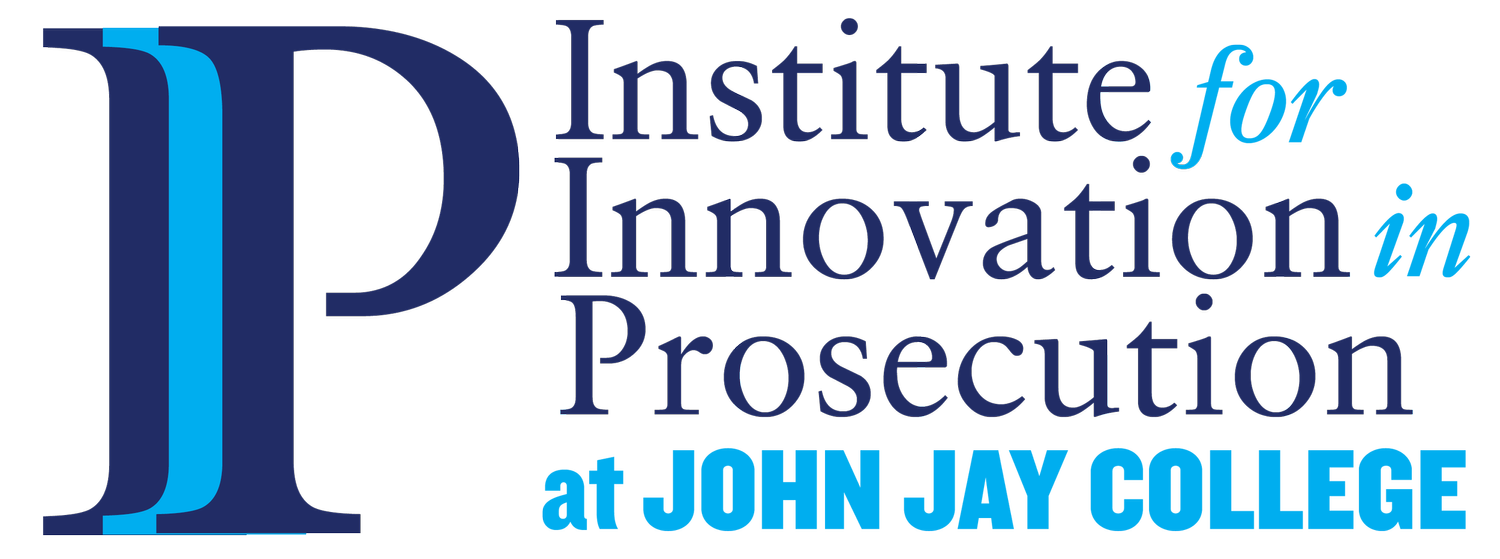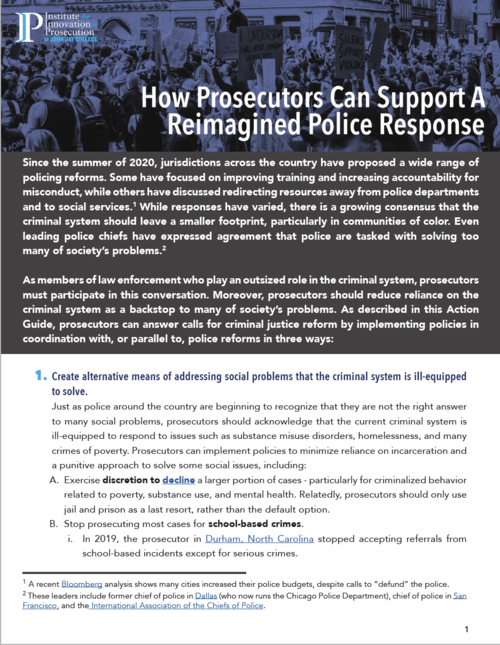LESSONS FROM 2020: A RACIAL AWAKENING FOR PROSECUTORS
The high-profile killings of George Floyd, Breonna Taylor, and Ahmaud Arbery sparked the deepest and most widespread response to police brutality in recent memory. In the midst of a pandemic, thousands of Americans took to the streets to demand an end to state violence against Black and Brown communities and change in the criminal legal system. Only time will tell, but 2020 appears to be a turning point for communities and policing. Although rarely discussed in public, the events of last year also spurred deeper conversations in prosecutors’ offices about the role of race in their work.
In December 2020, the IIP convened a number of elected prosecutors and community leaders to discuss how prosecutors reacted to recent events. Inspired by these conversations, the IIP produced two Action Guides. The first, How Prosecutors Can Support a Reimagined Police Response, describes how prosecutors can implement policies that reduce the negative impact of the legal system on Black and Brown communities, can make their own internal policies more transparent, and can hold officers accountable for misconduct. The second Action Guide, titled Creating a Culture of Racial Equity, recommends how prosecutors can create an office culture that embraces racial justice and supports prosecutors of color.
How Prosecutors Can Support A Reimagined Police Response
Since the summer of 2020, jurisdictions across the country have proposed a wide range of policing reforms. Some have focused on improving training and increasing accountability for misconduct, while others have discussed redirecting resources away from police departments and to social services. While responses have varied, there is a growing consensus that the criminal system should leave a smaller footprint, particularly in communities of color. Even leading police chiefs have expressed agreement that police are tasked with solving too many of society’s problems.
As members of law enforcement who play an outsized role in the criminal system, prosecutors must participate in this conversation. Moreover, prosecutors should reduce reliance on the criminal system as a backstop to many of society’s problems. As described in this Action Guide, prosecutors can answer calls for criminal justice reform by implementing policies in coordination with, or parallel to, police reforms.
Creating A Culture Of Racial Equity
Although some prosecutors have emphasized racial equity for several years, to date that focus has primarily targeted external policy changes, such as bail reform. The 2020 protests forced chief prosecutors and line attorneys -- especially prosecutors of color -- to look internally and question their role in a system that inflicts substantial harm on communities of color. This has led to an awakening for some prosecutors, and reaffirmation among others, that issues of racial inequity exist inside prosecutor’s offices as well.
Reform-minded prosecutors cannot effectively implement external changes unless their internal office policies promote racial justice. To accomplish this, chief prosecutors should first acknowledge that a line prosecutor’s identity can impact how they view their work, and that Black and Brown prosecutors in particular may struggle with their role in a racially disparate system. In addition, elected prosecutors should look beyond diversity in hiring and retention. Prosecutors must establish an office culture that fosters essential conversations about race, and they must commit to examining policy through an anti-racist lens.
This Action Guide encourages chief prosecutors to implement internal policies to promote racial justice and support prosecutors of color. All of these ideas are small but significant steps to ensure that the momentum for reform leads to lasting change.
Why Culture Change For Prosecutors Is ‘More Than Hiring People Of Color’
The killing of George Floyd, close on the heels of the murders of Breonna Taylor and Ahmaud Arbery, was the last straw for millions of Americans, sending them to the streets calling for changes to our criminal justice system—and it’s also a “wake up call” for elected prosecutors, write 11 of the nation’s top DAs and legal experts.
In an open letter [released today], the signers acknowledged that being forced to reflect on their role was “uncomfortable but familiar territory.”
“It was a wake-up call for elected prosecutors who wield an enormous amount of power in criminal cases,”the letter said.
“For some prosecutors and their staff of color, particularly Black and Brown prosecutors, reflecting on their role in a system that harms communities of color was uncomfortable but familiar territory. For many, however, it was a true and long-overdue awakening that shifted how they view their work and themselves.”



